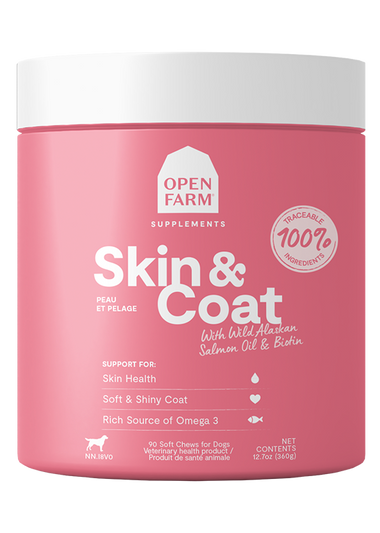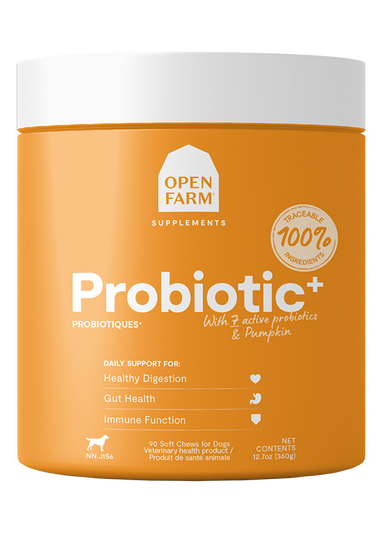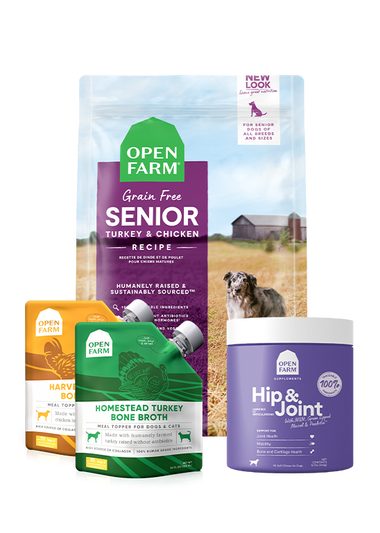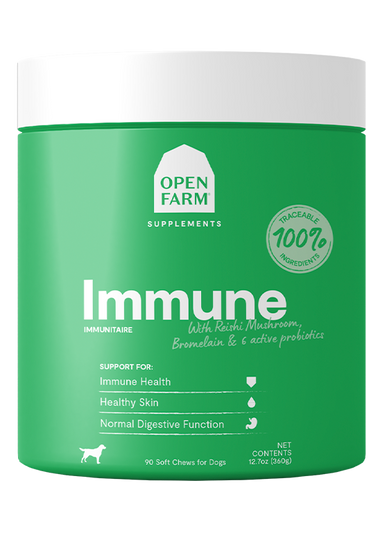You’ve likely wondered, “Do dogs need vitamins?” Well, the answer depends on your dog’s diet, health, and specific nutritional needs. Just like you, your dog requires vitamins and minerals to maintain optimal health. Does your pup need additional supplements? This depends on several factors.
Do Dogs Need Multivitamins?
If your dog is healthy and you feed it a complete and balanced commercial diet, it should receive all the vitamins and minerals it needs from its food. For instance, Open Farm’s recipes are made from high-quality ingredients like humanely raised meats, sustainably sourced fish, and non-GMO produce to naturally provide vitamins and minerals. To ensure pets are getting complete and balanced diets according to Association of American Feed Control Officials (AAFCO) guidelines, we add a small amount (less than 1%) of vitamins and minerals to our recipes—similar to how pet parents take multivitamins. These nutrients are made to mimic how the body naturally absorbs them and are from trusted, non-GMO sources that are chelated for maximum absorption.
However, your dog might benefit from additional multivitamins or supplements if the following apply:
-
Homemade Diets: Do you prepare your dog’s meals from scratch? If you do, your dog’s bowl might be missing key nutrients. In this case, a multivitamin can help fill nutritional gaps.
-
Picky Eaters: Dogs with selective eating habits may not get all the nutrients they need from their food.
-
Senior Dogs: An elder dog may require extra support for joint health, immunity, or digestion which multivitamins can provide. Multivitamins formulated for older dogs can address age-related deficiencies and support overall health.
-
Health Conditions: Dogs with specific health issues or those recovering from illness may benefit from targeted supplements under veterinary guidance.
-
Puppies: Growing puppies on specialized diets usually receive all required nutrients but multivitamins may be helpful for those on homemade or incomplete diets.
- Pregnant or Nursing Dogs: Dogs with increased nutritional demands during pregnancy or nursing may need additional vitamin support.
Do Dogs Need Supplements?
Your dog doesn’t necessarily need supplements but certain conditions may warrant them. Supplements are commonly used to remedy health concerns like the following:
- Joint Health:
- Glucosamine and chondroitin are popular supplements for dogs with arthritis or joint pain.
- These supplements support cartilage health and help maintain joint mobility in senior dogs or large breeds.
- Skin and Coat Health:
- Omega-3 fatty acids from fish oil can promote a shiny coat and healthy skin.
- Digestive Support:
- Probiotics and prebiotics help maintain a healthy gut microbiome, particularly if your dog has a sensitive tummy or digestive issues.
- Immune System Support:
- Antioxidants like vitamin E and vitamin C can support your dog’s immune system, especially during illness or stress.
- Lifestyle:
- Highly active dogs or working breeds may benefit from extra nutrients to support their energy needs.
- Breed-Specific Needs:
- You might be a pet parent to a breed that’s predisposed to conditions like hip dysplasia or heart disease. Targeted supplements may prove helpful.
- Veterinary Advice:
- Always consult your vet before introducing any supplements. They can recommend products that address your dog’s unique needs without causing harm.
What Supplements Might my Dog Need?
Vitamin supplements can play a critical role in addressing deficiencies or specific health concerns. Here are some common vitamins and their benefits:
-
Vitamin A: Supports vision, immune health, and skin health.
-
Vitamin D: Aids calcium absorption for strong bones and teeth.
-
Vitamin E: Acts as an antioxidant and supports skin and coat health.
-
Vitamin C: Boosts the immune system and acts as an anti-inflammatory.
- B Vitamins: Essential for energy metabolism, nerve function, and red blood cell production.
Most complete diets include these vitamins in appropriate amounts, so additional supplementation is only needed under veterinary guidance.
Safety Tips for Using Supplements
Although supplements can work wonders, improper use can cause harm. Remember these safety tips:
-
Consult Your Veterinarian: Always seek veterinary advice before starting any new supplement.
-
Avoid Over-Supplementation: Too much of certain vitamins or minerals like vitamin D or calcium can lead to toxicity or other health issues.
-
Use Quality Products: Choose reputable brands, like Open Farm, that meet regulatory standards for safety and efficacy.
- Follow Dosage Instructions: Administer supplements according to the product’s guidelines to avoid adverse effects.
Final Thoughts
Do dogs need vitamins? Vitamins or supplements might not be necessary if your dog is currently healthy and enjoys a complete and balanced diet. However, health conditions, age, or homemade diets could mean your pal requires additional nutritional support.
Always check in with your vet to determine if your dog could benefit from a multivitamin or supplements. This will help ensure your dog receives the best possible care and results. You can make informed decisions that promote your dog’s health when you understand your dog’s unique needs.
This article is meant only as an example of what might work well for your pet, please reach out to our Pet Parent Experience Team if you have any questions about your pet’s own unique circumstances! To ensure these products are a good fit for your furry friend, we also recommend consulting your vet about any new diet, or environment changes, especially if there is a medical concern. They should be able to help as you and your vet know your pet’s medical history best!








































 Sign In
Sign In
 Create Account
Create Account














